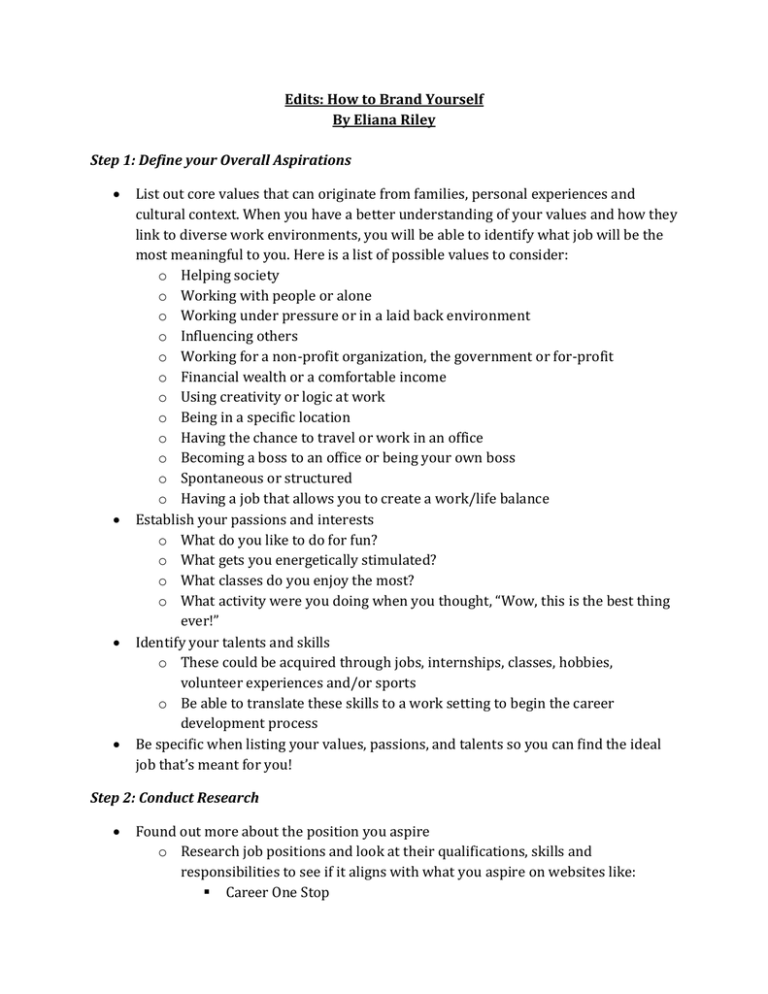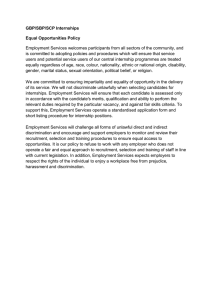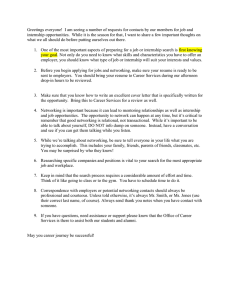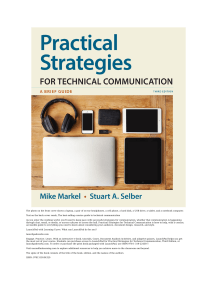Edits: How to Brand Yourself By Eliana Riley
advertisement

Edits: How to Brand Yourself By Eliana Riley Step 1: Define your Overall Aspirations List out core values that can originate from families, personal experiences and cultural context. When you have a better understanding of your values and how they link to diverse work environments, you will be able to identify what job will be the most meaningful to you. Here is a list of possible values to consider: o Helping society o Working with people or alone o Working under pressure or in a laid back environment o Influencing others o Working for a non-profit organization, the government or for-profit o Financial wealth or a comfortable income o Using creativity or logic at work o Being in a specific location o Having the chance to travel or work in an office o Becoming a boss to an office or being your own boss o Spontaneous or structured o Having a job that allows you to create a work/life balance Establish your passions and interests o What do you like to do for fun? o What gets you energetically stimulated? o What classes do you enjoy the most? o What activity were you doing when you thought, “Wow, this is the best thing ever!” Identify your talents and skills o These could be acquired through jobs, internships, classes, hobbies, volunteer experiences and/or sports o Be able to translate these skills to a work setting to begin the career development process Be specific when listing your values, passions, and talents so you can find the ideal job that’s meant for you! Step 2: Conduct Research Found out more about the position you aspire o Research job positions and look at their qualifications, skills and responsibilities to see if it aligns with what you aspire on websites like: Career One Stop O*Net Occupational Outlook Handbook Have informational interviews with employers that hold the position you desire and ask them questions about their kind of work to gain more insight Research how to become an expert in something related to your desired business Build your resume o Employers not only want to see your experiences within the desired field and academic excellence, but also want to see that you have been involved on campus and have engaged in volunteer activities. o Show that you have done research projects, received awards, gone to study abroad, upheld a leader position etc. Apply for an internship o Gain more practical experience within your desired field and learn more about the working dynamics so you have an understanding of what it will be like when you are in the workforce o Attend Career Fairs and Career events to find internship opportunities and meet with employers Step 3: Establish a Website or Blog Potential employers use search engines like Linked In, Google and Facebook to research, connect and possibly interview qualified candidates; this is why it is essential to have a personal profile on the web. Reasons why Students should use Linked In: o 80% of recruiters report using social media to find job candidates – 98% of these use LinkedIn o Manage your online brand o Connect with classmates, alumni, faculty, and family professionally o Display your skills and abilities o Begin building a network o Research companies and find internships or full-time job opportunities The Five Golden rule for creating a Linked In profile: 1. Professional photograph alone (Photos should be no larger than 80 x 80 pixels) 2. Headline with area of study or career ambition 3. Keyword rich summary with the type of position you are seeking 4. Inclusion of volunteer activities, internship and extra-curricular activities 5. Written recommendation from professor, advisors or supervisors Step 4: Generate Brand Awareness through Networking Networking is the best way to connect with other individuals in your industry. When forming relationships with others in your desired area, it offers more possibilities of getting a job because they can recommend you to other employers. Here are some networking opportunities: o Informational Interviewing o Job Shadowing o LinkedIn -Career Contact Bank o Networking Organizations o Chamber of Commerce o Professional Associations o Alumni events Interaction o Find a common ground to break the ice o Express passion and interest in your desired area o Research companies and ask questions Informal/Casual Networks o Reach out to friends, parents, friends of friends and acquaintances to build connections


